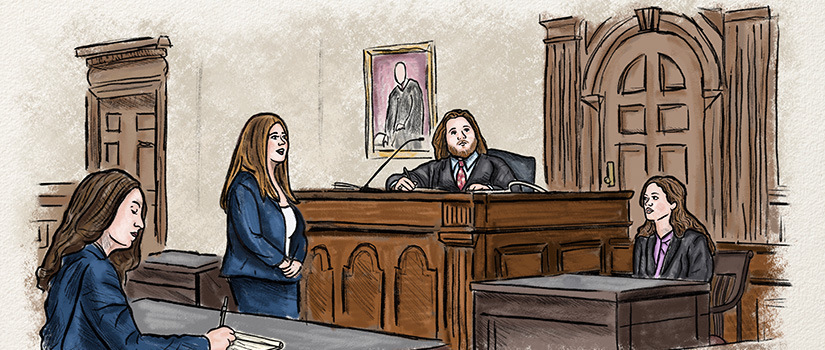Brett Bayne (’11) has been passionate about trial advocacy since before attending law school, so accepting an opportunity to coach his alma mater’s Mock Trial team was a no-brainer.
This year is Bayne’s 10th anniversary as head coach, and during his tenure, the USC Rice School of Law has grown into one of the country’s best Mock Trial programs comprising students who are equally determined and passionate.
“Winning begets winning,” Bayne says, “But you've got to get there first.”
Bayne was a member of Mock Trial during law school, joining the team when he became eligible as a 2L in 2009 – just a year after it was founded. He recalls occasionally practicing up to 35 hours a week with the team, but despite their hard work, they did not win any competitions.
After graduating, Bayne spent a year clerking but remained connected with the law school and, less than two years after earning his law degree, became Mock Trial’s first head coach. Although he was unproven, he dedicated his free time to the program, determined to lead the team to victory.
His first year as coach was also the first year the law school allocated funds for competition travel costs and entry fees. The investment paid off the second year when the team made it to the national finals. By 2015 Mock Trial won their first competition: the Carolina’s Cup hosted by the now-defunct Charlotte School of Law.
“I think that ultimately was the catalyst,” Bayne says. “Watching the round, I thought, ‘This is what we’ve been trying to get to.’”
Effective advocacy – and Mock Trial wins – is more than intensive preparation. It demands complementary talents, chemistry and, perhaps most importantly, trust. Confidence in each other allows teammates to improvise when the need arises.
3L Tanner Wise, Mock Trial Bar’s chief justice, recalls a moment of seeming telepathy with his cocounsel 3L Zach Freeman during a flash trial against UCLA, the No. 1 ranked team in the country. While presenting his final argument, Wise realized that to respond to his opponent, he needed an exhibit he and Freeman had not previously discussed.
“Without even a look at Zach, I go out on a limb, ‘If we could look at...’” Wise says. “Immediately, he already had the exhibit prepared, already was on PowerPoint ready to share it, and already highlighted the section I needed. He knew exactly where I was going.”
The team spent the next few years accumulating awards, but it wasn’t until a challenge ceremony in 2018 that Bayne felt the team had truly arrived. Competitors drew numbers to determine the order of choosing opponents, and the school with the first pick chose the USC Rice School of Law. The showrunner paused to ask the team if they were certain. Then another coach tried to dissuade them. The team doubled down. USC won each round.
“It was a funny moment,” Bayne says. “You want to see people draw you and go, ‘Oh no, we have to face South Carolina,’ and that's where we're at now.”
Within 15 years of its founding and 10 of securing funding and a head coach, USC Rice School of Law Mock Trial consistently ranks among the country’s best programs.
“The people in our program are absolutely stellar advocates, and we owe it to Brett Bayne full stop,” Wise says. “Brett puts everything that he has into these advocates, who become champions in their own right and then come back and serve as supplemental coaches.”
Several of their names appear on the dozens of awards papering the Mock Trial Bar office wall, celebrating alumni now found throughout the country from the U.S. Attorney General’s office to solicitor and public defender's offices, as well as plaintiff and defense private practice. They all vie to be the best advocates they can be and are dedicated to developing the next generation of lawyer leaders, too.
“There's a lot of give and take between the alumni coaches and the students in terms of teaching each other,” Bayne says. "One of the benefits I get out of this, aside from watching them grow and become phenomenal trial lawyers, is it keeps the rust off.”
Bayne says the value for students is in learning to try the case themselves, with guidance from the legal professionals, and their record affirms the notion. The team has a national reputation as a formidable opponent, but Bayne takes greater pride in the recognition they receive for their professionalism.
“Winning overall feels nice,” Bayne says, “but we’ve won a number of “Most Professional Team” awards, and those are probably the best.”
That professionalism is essential in a field where friends may be on opposing counsel. As law students embark on new careers and discover new passions, the amount of time Mock Trial members spend together means they are privy to defining moments in each other's lives, and the bonds they forge remain.
“The Mock Trial program has been the absolute best part of law school,” 3L Abigail Lodge says. “What we have in this program isn’t just about the trophies – although they’re wonderful – but what we have as a team is so incredibly special. My law school experience would not be complete without them. They're my family.”
